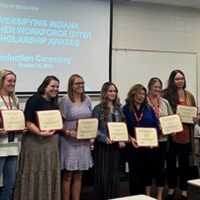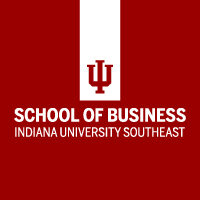Bachelor of Applied Health Science in Safety
In the four-year degree program, students have the opportunity to participate in professional safety and health protection organizations including student chapters of Eta Sigma Gamma and the American Society of Safety Engineers. Safety management or emergency management public or private sector internships may be pursued by students as part of their educational experience.
Safety professionals pursue careers to enhance the protection of communities and reduce injuries/fatalities. Graduates serve as safety specialists, safety trainers, management consultants, safety inspectors, safety managers, safety educators, emergency planners, safety and HR directors and administrators. Other fields associated with health protection include industrial hygiene, ergonomics, fire protection, security, environmental science and engineering.
BACHELOR OF APPLIED HEALTH SCIENCE IN SAFETY CREDIT HOURS AND DEGREE RESIDENCY REQUIREMENTS
The IU School of Public Health Safety Degree of the Applied Health Science Department at Bloomington is hosted on the IU Southeast campus by the General Studies Program. It requires a minimum of 120 credit hours and a minimum of 30 credit hours of upper-level coursework (300-level or above). No more than 64 credit hours earned in accredited junior/community colleges may be applied toward a Baccalaureate degree. The University Residency Requirement dictates that students must complete no less than 26 credit hours at IU Southeast during their senior year and no less than 10 credit hours of coursework in the major field of study.
BACHELOR OF APPLIED HEALTH SCIENCE IN SAFETY DEPARTMENT RESIDENCY REQUIREMENTS
The Applied Health Science Department enforces the University Credit Hour & Residency Requirements with no additions.
Upper Level Course Requirements
30 credit hours of upper-level (300-400) courses
Must have at least 3 credit hours of an upper level in another disciplinary area other than Arts and Humanities
*The Capstone counts as an upper-level course
*Approved internships count as upper-level hours
Electives
EDUC, MIL, BUS, LSTU, NURS, OLS, SUPV, HPER/SPH courses fit in this category.
Credit Hour Requirements
- Minimum 120 credit hours for BGS
- Maximum credit hours accepted from 4-year college: 90; not to exceed 90 hours in combination
- Maximum credit hours accepted from 2-year college: 64; not to exceed 90 hours in combination
- Must earn at least 18 credit hours after admission to BGS
- See General Studies advisor for information about CLEP, DSST, and PLA credits
BACHELOR OF APPLIED HEALTH SCIENCE IN SAFETY General Education Core Requirements
All IU Southeast Baccalaureate degrees require 30 credit hours of General Education Core coursework. Students must select a course(s) to satisfy each category listed below. View the list of courses that satisfy the General Education Core requirements.
- Information Literacy (1 credit)
- Written Communications I (3 credits)
- Written Communications II (3 credits)
- Oral Communications (3 credits)
- Ethical Reasoning/Diversity (3 credits)
- Natural Sciences (one lecture – 3 credits, one lab – 2 credits)
- Arts/Humanities( 3 credits)
- Social Science (3 credits)
- General Education Additional Requirement (Art, Humanities, or Social Science) (3 credits)
Please note that several courses required for your Major may “double dip” with the general education core courses.
BACHELOR OF APPLIED HEALTH SCIENCE IN SAFETY SCIENCE REQUIREMENTS
Safety and Health Courses (48 cr.)
A minimum grade of C– is required in each professional core course.
Complete each of the following courses:
- SPH-H 174 Prevention of Violence in American Society (3 cr.)+S&H
or
- SPH-S 255 Threats, Violence, and Workplace Safety (3 cr.)
- SPH-S 101 Introduction to Safety (3 cr.)
Provides an overview of the variety of careers available in the safety profession. Examines the broad areas practiced by safety professionals including regulatory compliance, environmental protection, ergonomics, industrial hygiene, emergency management, recreational safety, personal safety, healthcare, training and instruction, system safety, fire protection, and hazardous materials management. - SPH-S 151 Legal Aspects of Safety (3 cr.)
Discusses legal requirements for safety, health, and environmental compliance. Emphasis is given to OSHA, EPA, and consensus standards, as well as other applicable Federal regulations. - SPH-S 201 Introduction to Industrial Hygiene (3 cr.)
The concepts, principles, and techniques in the practice of industrial hygiene are presented. The identification, evaluation, and control of occupational health hazards are discussed. An orientation to selected instrumentation used to assess the workplace is provided. - SPH-S 210 General Industry Standards (3 cr.)
An introduction and analysis of the Occupational Safety and Health Administration (OSHA) general industry standards as they apply to both the private and federal sectors. Includes an inspection practicum. - SPH-S 214 OSHA Construction Standards (3 cr.)
An introduction to and application of OSHA and Indiana OSHA construction standards as they apply to both the public and private sectors. Course includes an inspection practicum. - SPH-S 231 Safety Engineering and Technology (3 cr.)
Introduces safety engineering principles applied to the control of hazards associated with industrial processes, facilities, chemical processes, materials handling, machine operation, and electricity. - SPH-S 251 Incident Investigation and Analysis (3 cr.)
Introduction of questioning and interviewing techniques for incident investigation and analysis. Examines injury causation theories, evaluation, reporting, legal aspects, and using investigation findings as a prevention tool. Reviews root causes in management systems. - SPH-S 332 Ergonomics and Human Factors (3 cr.)
P: Prerequisite or concurrent: ANAT-A 215 or SPH-K 205. The application of ergonomic principles and human factors techniques to the design and evaluation of workplaces and equipment. - SPH-S 336 Emergency Management (3 cr.) or SPH-S 352 Safety System Analysis (3 cr.)
P: SPH-S 302. An all-hazard multidisciplinary response and recovery. Topics include identifying critical roles, risk assessment, strategies, planning concepts and methodologies, establishing effective integrated and coordinated programs, crisis management, communication and response. - SPH-S 345 Safety Program Management (3 cr.)
P: 6 credits of SPH-S courses, or instructor consent. Principles, theories, and concepts of safety and health program management with comparisons of past, present, and future practices. Review of managing behavior of individuals, groups, and organizations. Focuses on managing a total safety program. - SPH-S 410 Advanced Industrial Hygiene (3 cr.)
P: SPH-S 201 and CHEM-C 102. Provides definitive application of principles and concepts for the solutions of workplace health and physical hazards. Program management techniques are discussed. Research procedures and techniques are introduced through individual and group projects. - SPH-S 411 Industrial Hygiene Sampling and Analysis (3 cr.)
P: SPH-S 410 and CHEM-C 106. Advanced, in-depth study of the approaches to workplace sampling. Emphasis is on sampling methods, passive sampling, sampling devices, breathing zone, and area sampling strategy. Course will include lab sessions and field experience. - SPH-S 415 Safety Education and Training (3 cr.)
P: 6 credits SPH-S courses or consent of instructor. Assessing training and education needs, establishing goals and objectives, planning and methods for delivery, using resources and evaluating effectiveness. Students develop evaluation instruments and conduct mock OSHA training. Emphasis is on improving safety performance in addition to compliance. - SPH-S 496 (Formerly HPER-S 444) Field Experience in Occupational Safety (6 cr.)
P: Instructor permission; Junior/senior standing; Safety majors only. (Formerly HPER-S 444) Field experience through on-the-job and related opportunities in occupational safety. Students will be assigned to industrial and occupational enterprises offering professional development for the safety specialist. Periodic critiques will be scheduled with supervisory personnel. Written progress reports will be required. S/F only.
Repeatable for credit.
Additional Major Courses (28 cr.)
Complete one of the following 10 credit chemistry sequences:
Preferred:
- CHEM-C 103 Introduction to Chemical Principles (5 cr.) +N&M
Designed specifically to alleviate deficiencies in chemistry and prepare students for C117-C127. Content includes applications of measurement and chemical formula/equation conversions; modern view of the atom; and solution processes that relate to chemical reactions. Lectures, labs, and discussion sections will emphasize problem-solving strategies. Credit given for only one of C103 or C101-C121. - CHEM-C 117 Principles of Chemistry and Biochemistry I (3 cr.) +N&M
P: C101-C121 or CHEM-C103, or chemistry and math placement examinations and consent of the department. Lecture course covering basic principles of chemistry and biochemistry, basic mathematical and conceptual principles in atomic structure and periodic properties, molecular structure, chemical bonding, energy (thermochemistry), kinetics, equilibrium and thermodynamics. Credit given for only one of the following: C105, C117 or S117. - CHEM-C 127 Chemistry and Biochemistry Laboratory I (2 cr.) +N&M
P or C: C117. Basic principles of chemistry and biochemistry that align with the topics in C117. Chemical bonding (atomic structure, molecular structure, molecular orbital theory, and non-covalent interactions), macroscopic properties (energy, kinetics, equilibrium, and thermodynamics). Hands-on laboratory techniques in chemistry necessary for success in later chemistry laboratory courses, especially organic chemistry. Credit given for only one of C127 or C125.
Also acceptable:
- CHEM-C 101 Elementary Chemistry I (3 cr.) +N&M
Essential principles of chemistry, atomic and molecular structure, bonding, properties and reactions of elements and compounds, stoichiometry, solutions, and acids and bases. For students who are not planning careers in the sciences and for those with no previous coursework in chemistry. Credit given for only one of C101 or C103. - CHEM-C 121 Elementary Chemistry Laboratory I (2 cr.) +N&M
P or C: C101. Introduction to the techniques and reasoning of experimental chemistry. Emphasis is given to study of physical and chemical properties of inorganic compounds. Credit given for only one of C101-C121 or C103. - CHEM-C 102 Elementary Chemistry II (3 cr.) +N&M
P: C101. Usually taken concurrently with C122. Continuation of C101. The chemistry of organic compounds and their reactions followed by an extensive introduction to biochemistry. - CHEM-C 122 Elementary Chemistry Laboratory II (2 cr.) +N&M
P: C101, C121. P or C: C102. Continuation of C121. Emphasis on organic and biochemical experimental techniques.
Complete each of the following:
- ENG-W 231 Professional Writing Skills (3 cr.)
P: Completion of the English composition requirement. Designed to develop research and writing skills requisite for most academic and professional activities. Emphasis on methods of research, organization, and writing techniques useful in preparing reviews, critical bibliographies, research and technical reports, proposals, and papers.
or
- BUS-X 204 Business Communications (3 cr.)
P: ENG-W 131 or equivalent with a grade of C or better. Business Communication prepares each student to write strategic, effective, and ethical messages and to collaborate in global business environments. Students learn to: apply the complex communication process model to specific contexts; construct and critically analyze arguments; write clear, concise, and audience-centered business documents; collaborate within team environments to deliver effective messages. - PSY-P 101 Introductory Psychology I (3 cr.) +N&M
Introduction to psychology; its methods, data, and theoretical interpretations in areas of learning, sensory psychology, and psychophysiology. Equivalent to IUPUI B105 and P151. Credit given for only one of P101, P106, P151, or P155. I Sem., II Sem., SS. - PSY-P 102 Introductory Psychology II (P: P 101 or P 151) (3 cr.) +S&H
P: P101 or P151. Continuation of P101. Developmental, social, personality, and abnormal psychology. Equivalent to IUPUI B104 and P152. Credit given for only one of P102, P152, or P106. I Sem., II Sem., SS.
or
- SOC-S 100 Introduction to Sociology (3 cr.) +S&H
Introduction to the concepts and methods of sociology with an emphasis on understanding of contemporary American society. - SPH-B 150 Introduction to Public Health (3 cr.) +S&H
Focuses on rationale, history and development of public health in the U.S. and globally. Emphasis on underlying theories, scientific, and social basis for public health practice plus the impact of critical public health concerns on society. Professional disciplines, organizations, and methods that interact to improve the public’s health are addressed. - SPH-K 205 Structural Kinesiology (3 cr.)
Overview of basic human body structures and functions appropriate for beginning students in physical education. Fundamental concepts concerning the interaction of biological and mechanical aspects of the musculoskeletal and neuromuscular structures. Emphasis on practical application to study and teaching of skilled human movement.
or
ANAT-A 215 Basic Human Anatomy (5 cr.) +N&M
TBD
SPH-Q 381 (Formerly: SPH-H 381) Introduction to Biostatistics (3 cr.)
A conceptual approach is utilized to introduce students to sources of public health data. Basic concepts and models are available to understand and analyze data and information related to prevention of diseases and promotion of health and determinants of health behavior.
or
MATH-K 300 (3 cr.)
An introduction to statistics. Nature of statistical data; ordering and manipulation of data; measures of central tendency and dispersion; elementary probability. Concepts of statistical inference decision; estimation and hypotheses testing. Special topics discussed may include regression and correlation, analysis of variance, non-parametric methods.
or
PSY-K 300 Statistical Techniques (3 cr.)
P: MATH M118 or M119. Introduction to statistics; nature of statistical data; ordering and manipulation of data; measures of central tendency and dispersion; elementary probability. Concepts of statistical inference and decision: estimation and hypothesis testing. Special topics include regression and correlation, analysis of variance, non-parametric methods. Credit given for only one of K300 or K310, ANTH A306, CJUS K300, ECON E370 or S370, MATH K300 or K310, POLS Y395, SOC S371, STAT K310 or S300 or S301, or SPEA K300. I Sem., II Sem., SS.
Professional Electives (15 cr.)
Complete 15 credits from the list of safety professional electives. A minimum of 12 of the 15 selected credits must be at the 300/400 level. A minimum grade of C- is required in each professional elective course.
+ Courses followed by a N&M notation apply toward completion of both the major requirement and the general education, natural and mathematic sciences requirement.
+ Courses followed by an S&H notation apply toward completion of both the major requirement and the general education, social and historical studies requirement.
Suggested Courses for the First-Year Safety Student
Fall Semester
ENG-W 131 Elementary Composition 1 (3 cr.) or equivalent
PSY-P 101 Introduction to Psychology I (3 cr.)
SPH-S 101 Introduction to Safety (3 cr.)
Arts and Humanities Elective (3 cr.)
Free Elective (3 cr.)
Spring Semester
MATH-M 118 Finite Mathematics (3 cr.)
PSY-P 102 Introduction to Psychology II (3 cr.)
SPH-H 174 Prevention of Violence in American Society (3 cr.)
SPH-S 151 Legal Aspects of Safety (3 cr.)
World Languages and Cultures Elective (3 cr.)












